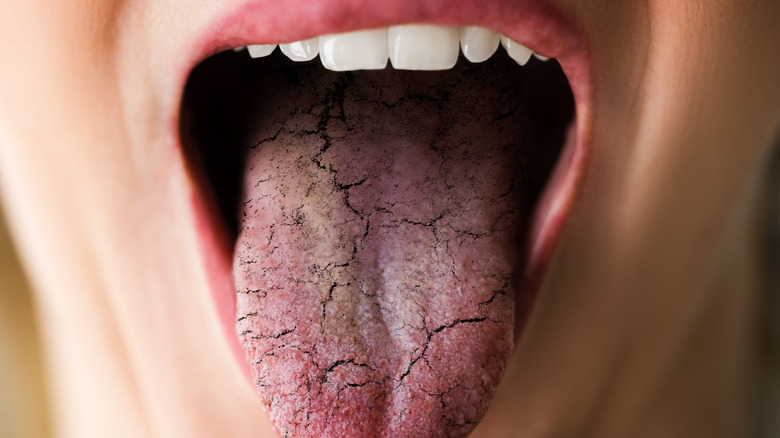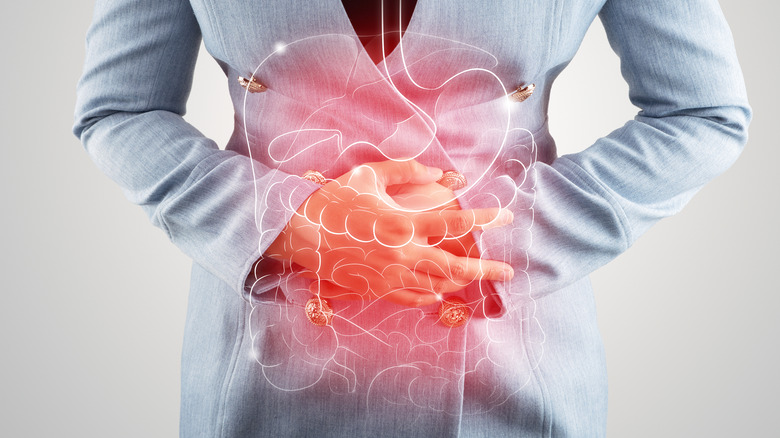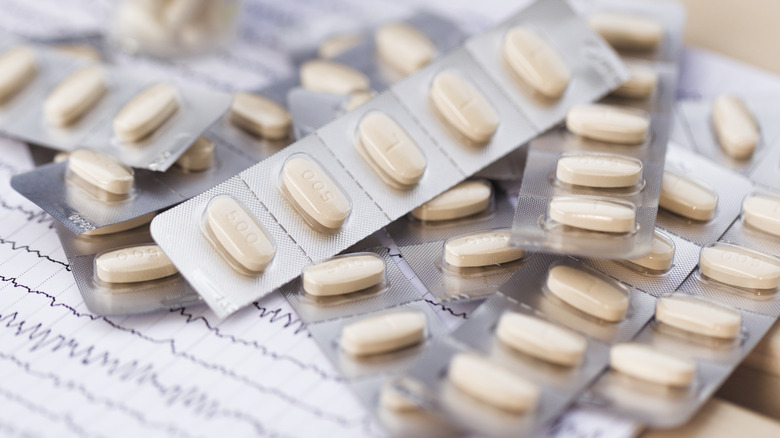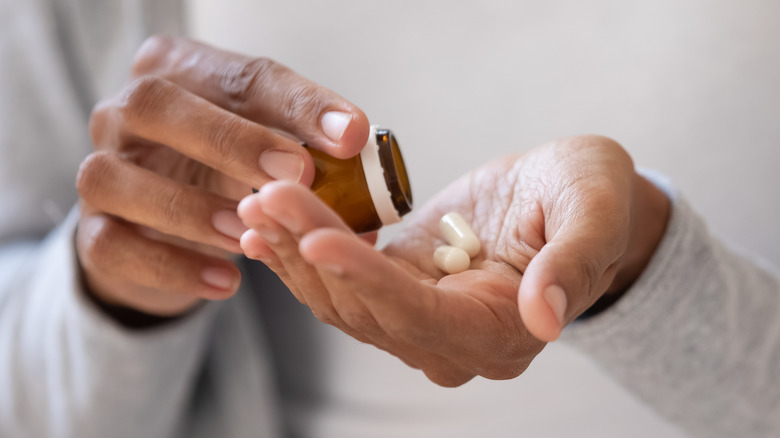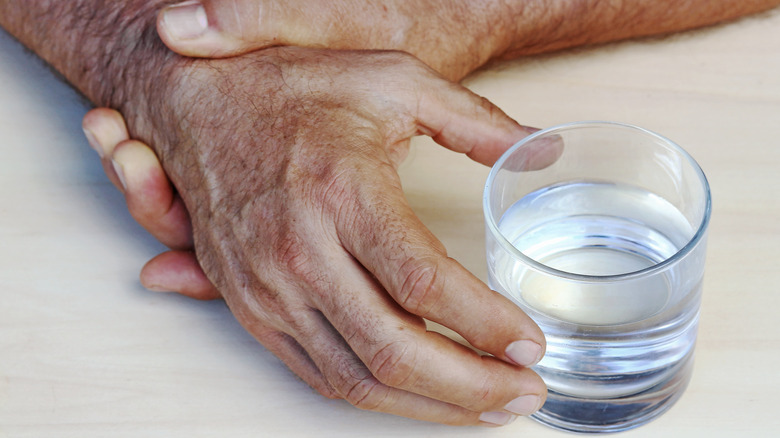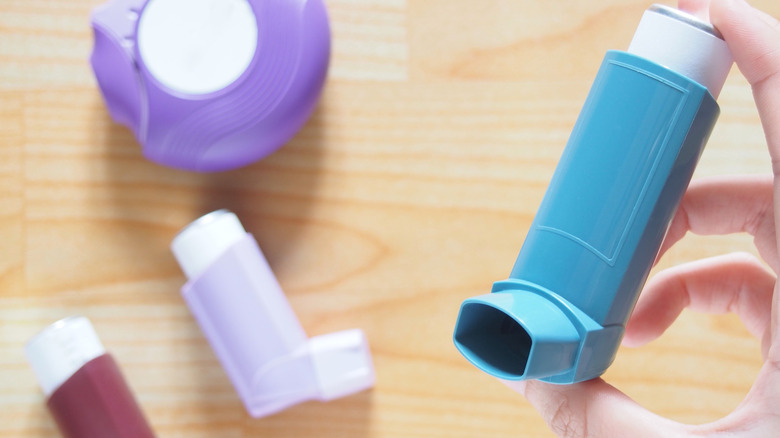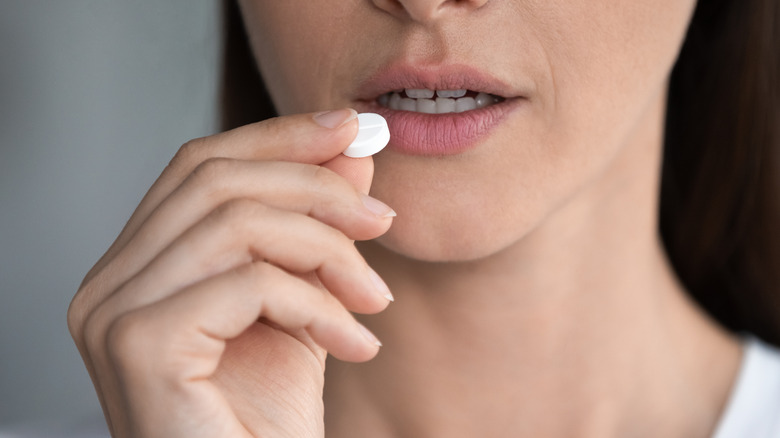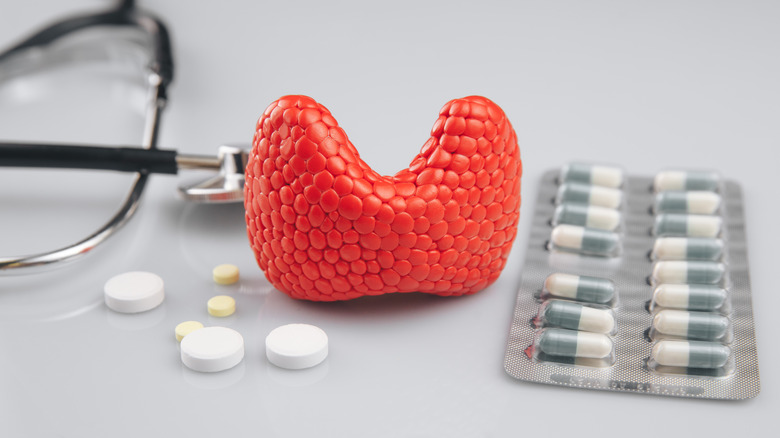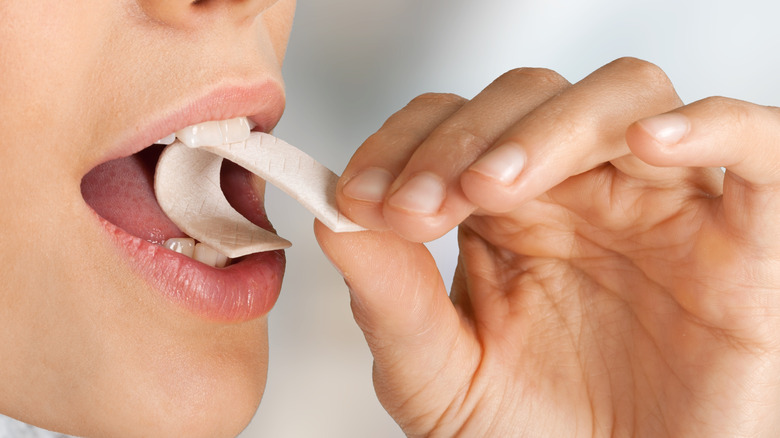These Medications Could Be Causing Your Dry Mouth
Also referred to as xerostomia, the common condition known as dry mouth affects approximately 25% of adults, and the Oral Health Foundation states that the number climbs closer to half as you reach 55 and above. According to a review in Autoimmunity Reviews, dry mouth is a prevalent oral health issue involving dysfunctional salivary glands. Dry mouth causes mouth burning, dry lips, bad breath, infections, and decreased sense of taste. Xerostomia can also result in tooth decay, gum disease, and eating, talking, and swallowing problems (per NHS Inform).
Saliva consists of electrolytes, enzymes, antimicrobial proteins, glycoproteins, immunoglobulins, growth factors, and mucins. Your body produces this substance to slow down the growth of bacteria in your mouth and neutralize the acids it creates when you eat and, along with saliva's ability to aid with removing food from your mouth, reduces tooth decay. Saliva also improves your sense of taste and makes chewing, swallowing, and digesting easier (per the Mayo Clinic).
Dry mouth may result from other diseases, such as diabetes, neurological problems, and radiation therapy. In addition, certain medications, both prescription and over-the-counter, also cause dry mouth. Here are some examples.
Anti-anxiety/antidepressants/antipsychotics
Per Current Psychiatry, over one-third of those prescribed one of five antidepressants experienced dry mouth, with similar results reported with those taking antipsychotics. Furthermore, studies referenced by The Dental Elf show that patients taking one of 23 antidepressants or 22 antipsychotic or anticonvulsant drugs had oral side effects. Over 90% of those who had mouth issues associated with their medication indicated they had xerostomia.
Many medications used for mental health are anticholinergics because these drugs block a specific type of neurotransmitter known as acetylcholine. In doing so, more serotonin (and in some cases, norepinephrine) is available to your brain. However, these prescriptions also block the involuntary muscle movements required to produce saliva (per BIOTÈNE).
Psychiatrists and other mental health professionals fail to screen for dry mouth because medical schools often gloss over the effects of oral health on a person's overall well-being. Additionally, those treating mental health issues must concentrate on the patient's risk of harming themselves or others over their teeth (via Current Psychiatry). However, the studies referenced in Current Psychiatry not only listed dry mouth as the top reason for failure to take one's medication as prescribed, but also found that those with mental illness tend to neglect their dental health more than everyone else. Patients treated for mental illness often fail to see a dentist regularly and lose more teeth than the general population.
Antidiarrheals
If you have a bout of diarrhea, then the muscles in your gut are contracting too fast, causing food to travel through your system too quickly. As a result, you end up with frequent, watery bowel movements (per Healthline). Diarrhea results from many different health issues, including infection, food intolerance or allergy, parasites, and as a side effect of some antibiotics (via Johns Hopkins Medicine).
The U.S. Food & Drug Administration (FDA) approved loperamide, sold under the name brand Imodium, to treat several different types of diarrhea. Loperamide gets absorbed through your gut (per a review in the Journal of Pharmacy and Pharmacology). It then gets metabolized in your liver and distributed through your circulatory system (per Journal of Pain and Symptom Management).
According to Practical Pain Management, loperamide decreases the activities controlled by your central nervous system, peripheral nervous system, and autonomic nervous system when it reaches your brain. As a result, loperamide slows down the speed at which food moves through your digestive tract giving your bowel additional time to absorb what your body needs (via Healthline). At the same time, this drug also slows down your saliva glands.
Antiepileptics
The CDC reports that over three million adults have epilepsy. Of those, the Epilepsy Foundation states that 90% take medications to control seizures, and that number jumps to 95% when a patient sees a neurologist or epilepsy specialist.
The medication prescribed helps limit the number of seizures you have by balancing out neuronal excitation and inhibition (per the Department of Molecular and Clinical Pharmacology, University of Liverpool). Your nerve cells communicate using electrical signals sent along channels, and the connections made are called synapses. Some cells work to send the communication forward, and are known as excitatory. Others slow down and stop the signal, and are called inhibitory. Epileptic seizures happen when an imbalance between the two occurs (via The Royal Children's Hospital Melbourne).
Once you swallow your antiepileptic medication, it goes to your stomach, gets absorbed into your bloodstream, and circulates to your brain, helping to regulate communication between your nerve cells. The medication does this by affecting either the ions in the cell membranes or the neurotransmitters in the synapses. Medical professionals at Channel Islands Family Dental Offices explain that because these drugs work by altering your central nervous system, they can decrease your salivary glands' saliva production, leading to dry mouth.
Antihistamines/decongestants
According to Reuters Health, nearly 50 million Americans have allergies, and at least a third of them rely on antihistamines, decongestants, or a combination of the two to treat the related nasal congestion, sneezing, and runny nose (via the Mayo Clinic). These symptoms result from the body's production of the chemical histamine, which promotes inflammation and causes allergic reactions (per Reuters Health).
However, the medical professionals at the Cleveland Clinic explain that histamine also plays a role in dilating blood cells, controlling muscle contractions, and assisting with nerve cell communication and bodily fluid movement. Therefore, using antihistamines blocks histamine production not only when related to allergies, but also in all brain cells with receptors for the chemical (via Reuters Health).
Decongestants are often used alone or in conjunction with antihistamines and work to clear your nasal congestion by constricting your blood vessels (per the Mayo Clinic). While this allows air to pass through your nose, it also shrinks blood vessels in other body parts, including your saliva glands (per Robert H. Oliver, MD). Additionally, pseudoephedrine, the most common decongestant sold under the brand name Sudafed, works on your central nervous system, which controls saliva production (via ScienceDirect).
Antiparkinsonians
The Parkinson's Foundation reports that Parkinson's disease affects over 10 million people worldwide. The disease affects the brain and results in shaking, stiffness, difficulty with balance and coordination, and an inability to control your movements (per The National Institute on Aging).
Medical professionals at the Cleveland Clinic often prescribe levodopa, sold under the brand name Sinemet, to treat those with Parkinson's. Your body converts levodopa into dopamine, which disseminates messages between your brain and nerves (via NHS). This chemical is created in a part of the brain that dies off in patients with Parkinson's (per The National Institute on Aging). You can't take straight dopamine as a medication, because it can't cross the blood-brain barrier (via Osmosis).
Other medications doctors at the Cleveland Clinic prescribe include dopamine agonists Parlodel, Mirapex, and Requip. These drugs, taken alone or with Sinemet, copy dopamine's functions in your body. Symmetrel works to increase the amount of dopamine accessible to your brain. Anticholinergics decrease the amount of the chemical acetylcholine in your brain to balance it with dopamine. Finally, MAO inhibitors like Eldepryl make it so your body cannot get rid of the dopamine in your brain.
Regardless of which medication you use, changes to the dopamine levels in your brain also alter behavior, movement, mood, and memory, leading to various side effects, including dry mouth (per Healthline).
Bronchodilators
In 2019, Americans filled nearly 61 million prescriptions for albuterol (per Statista). Albuterol is a short-acting bronchodilator used by asthmatics to relieve lung spasms. Albuterol offers immediate relief that lasts up to six hours. There are also long-acting bronchodilators that help prevent spasms and reduce the amount of mucus in your lungs (via Asthma & Allergy Associates, P.C).
According to Charleston Allergy and Asthma doctors, bronchodilators like albuterol work by being inhaled into your lungs to relax and open your airways to make breathing easier. Also called inhalers, these medications not only help those with asthma, but also get prescribed to those with chronic cough, COPD, and bronchitis. Regardless of which medical condition you are using them to treat, bronchodilators contain one of three types of drugs (a corticosteroid, an anticholinergic, or a beta-2 agonist), all of which have dry mouth as a side effect.
Bronchodilators cause dry mouth in three ways (via BIOTÈNE). First, no matter how hard you try, you cannot inhale all the medication dispensed, and any left in your mouth can dry it out. Second, these drugs have been shown to decrease the amount of saliva you produce by nearly 30%. Finally, some people report developing the oral yeast infection known as thrush as a result of using an inhaler, and thrush reduces saliva production.
Cardiovascular drugs
In 2018, Consumer Reports, Inc. found that doctors wrote over 1.6 billion prescriptions for cardiovascular drugs. This group of medications includes those that normalize blood pressure and cholesterol to help lessen the risk of heart attack and stroke in those diagnosed with heart disease.
Scripps Health reports that there are seven different categories of cardiovascular medications commonly prescribed to those who had a heart attack or were diagnosed with heart disease. Aspirin reduces inflammation and helps prevent blood clots. Angiotensin-converting enzyme (ACE) inhibitors dilate your blood vessels to improve blood flow and reduce the demand placed on your heart while also lowering your blood pressure. Another type of medication, antiarrhythmics, help regulate your heart's electrical activity enabling your heart to beat normally. Additionally, blood thinners prevent blood clots, and beta-blockers improve your heart's ability to pump blood. Calcium channel blockers prevent calcium from entering your arteries and heart, increasing your blood and oxygen supply, and statins decrease bad cholesterol production (via the Cleveland Clinic).
Many of these medications cause dry mouth by changing adrenergic receptors found on your salivary glands and in your central nervous system. ACE inhibitors do so by preventing the accumulation of tissue mediators. Finally, calcium channel blockers cause xerostomia by controlling the amount of calcium (which plays an essential role in saliva creation) in your system (via a review in Physiology International).
Diuretics
ClinCalc reports that in 2020, doctors wrote nearly 90 million prescriptions for diuretics. According to Medical News Today, these drugs treat high blood pressure, congestive heart failure, kidney disease, and other health conditions that cause body tissues to swell. Also referred to as water pills, diuretics increase the amount of water and salt your body disposes of when you urinate to reduce the amount of fluid in your blood vessels. Doing so lowers your blood pressure and reduces the edema associated with several medical conditions (per Healthline).
The most common diuretic is Thiazides, which makes your kidneys extract more water and salt into your urine and relaxes your blood vessels (via Medical News Today). Loop diuretics stimulate your kidneys to produce more urine. To do so, your kidneys need to get more water from the rest of your body, which needs replacing — thus, reducing the amount of liquid in your body. Potassium-sparing diuretics are the only ones that don't cause you to lose potassium when you increase fluid output. Not affecting potassium levels helps those with arrhythmia, but isn't as effective as loop diuretics or Thiazides.
Studies referenced by Healthgrades Marketplace, LLC show that the decrease in your bodily fluid caused by diuretics correlates with a reduction in salivary gland activity.
Thyroid medication
Located in the front of your neck, your thyroid constantly releases hormones needed for metabolism, growth, and development. Unfortunately, this gland can become overactive (hyperthyroidism) and produce more hormones than your body needs, or underactive (hypothyroidism) and not make enough (per the National Library of Medicine). According to the American Thyroid Association, nearly 20 million Americans have one of these problems.
Though there are medications for hyperthyroidism, the most permanent solution (per the Cleveland Clinic) is to have your thyroid removed or destroyed. Once this is done, you will need to be on thyroid hormone replacement medications for the rest of your life. That medication is known as levothyroxine, sold under the brand name Synthroid (via Medical News Today). Philip K. King, PharmD, assistant professor of pharmacy practice at Butler University College of Pharmacy and Health Sciences in Indianapolis, explained to Optum, Inc that this medication is "designed to walk and talk just like the thyroid hormone created in your body." Levothyroxine helps reduce the effects of hypothyroidism, including feeling cold, having constipation, being tired, and gaining weight, as well as mental health issues, heart problems, and fertility issues. However, doing so is not without its own side effects. In fact, according to Medsafe, it is the number one medication reported to cause dry mouth.
Additionally, treatment for thyroid disease (radiation with a radioactive iodine isotope) can damage your salivary glands, leading to dry mouth (per Saliwell Ltd).
Muscle relaxants
According to ClinCalc, patients filled just under 40 million muscle relaxant prescriptions in 2020 to relieve muscle pain and spasms (via Medical News Today). Muscle spasms result from multiple sclerosis, motor neuron disease, and cerebral palsy, as well as from persistent head and back injuries, lower back pain, and whiplash (per Egton Medical Information Systems Limited).
Medical News Today reports that there are two different kinds of muscle relaxers. Antispastics improve tightness and spasms through your spinal cord and skeletal muscles. Meanwhile, antispasmodics reduce spasms by stopping neuron transmission from your central nervous system through your brain. Per a review in Physiology International, the most common complaint of users of the antispastic tizanidine report is dry mouth. A study referenced in the journal also shows that baclofen users had the same complaint.
Muscle relaxants work through your central nervous system. Doing so not only relaxes your muscles, but also reduces the production of the neurotransmitter that stimulates saliva production. Without this substance, your salivary glands fail to secrete saliva (per SmartMouth Oral Health Laboratories).
Proton pump inhibitors
Studies referenced by the American Medical Association state that in 2016, over 70 million prescriptions were written for the proton pump inhibitor (PPI) omeprazole, making it the most commonly prescribed drug in the United States. The write-up also stated that at least 10% of those who saw a doctor used a PPI.
PPIs lower the amount of acid the glands in the lining of your stomach produce. In doing so, these medications diminish gastroesophageal reflux disease (GERD) symptoms that occur when the contents of your stomach move up into your esophagus. Doctors also use PPIs to treat the damage to your esophagus caused by GERD and any stomach ulcers you may have (per MedlinePlus).
According to a paper in the Journal of Otolaryngology-ENT Research, saliva buffers the acids that come from your stomach. Unfortunately, research showed that individuals who took omeprazole for longer than six weeks experienced a lower salivary flow that led to bacteria growth (per Scandinavian Journal of Gastroenterology). Therefore, a decreased amount of saliva makes it so your saliva can't reach the acids to neutralize them (via Journal of Otolaryngology-ENT Research). However, once you stop using the drug, your saliva levels return to normal (per the Scandinavian Journal of Gastroenterology).
Smoking control medicines
The U.S. Department of Health & Human Services (HHS) reports that nearly 34 million adults in the U.S. smoke, and that smoking kills almost half a million people annually. Additionally, the CDC statistics state that for every person who dies from smoking, more than 30 live with a smoking-related illness. Furthermore, secondhand smoke contributes to over 40 million deaths every year. However, nearly 70% of smokers want to quit, more than half try annually, and 60% of smokers no longer do so (per HHS).
The CDC recommends using one of five types of nicotine replacement therapy (NRT) approved by the U.S. Food and Drug Administration to quit smoking. The most common forms of NRT are patches, gum, and lozenges. All of them replace the nicotine found in cigarettes to decrease the withdrawal symptoms and urges to smoke that often accompany trying to quit.
Nicotine is the chemical found in cigarettes that cause them to be addicting. When you smoke, nicotine unlocks your dopamine receptors, making you feel good. But once the feeling subsides, you need another cigarette to get it back. NRT works by supplying your brain with the addicting chemical nicotine (via Quit Victoria).
However, nicotine is both an immunosuppressant and a vasoconstrictor (per Taylor Dental). Therefore, like cigarettes, NRT minimizes the saliva flow in your mouth, resulting in dry mouth (via Mt. Holly Family Dentistry).
Dry mouth treatment
As Dr. Nigel Carter, OBE, told the Oral Health Foundation, "Dry mouth is far from just an inconvenience, it can cause real difficulty with speaking and eating and quite traumatic at times. Sufferers have explained how it has caused them to wake up in the middle of the night choking, gasping for breath, and even fearing for their life."
According to the Cleveland Clinic, your dentist will work to control whatever is causing your dry mouth and initiate ways to increase your saliva to lessen your chance of developing tooth decay. If you suspect (or get told by a medical professional) that a type of medication is causing your dry mouth, do not just stop taking it. Instead, speak with your doctor about a possible substitution or other steps you can take.
On your own, the Mayo Clinic recommends that you chew sugar-free gum, limit the amount of caffeine you get, stop using tobacco products, and make sipping water a part of your routine. You can also try consciously breathing through your nose instead of your mouth and use a humidifier to add moisture to the air.
Dry mouth prevention
According to the Herman Ostrow School of Dentistry of USC, over 1000 medications cause dry mouth or interfere with saliva production and flow. You may not be able to prevent it, but you can take steps to lessen this particular side effect (via DentalSelect).
The NHS recommends you drink enough water during the day. You can supplement your drinking by sucking on ice cubes or unsweetened drinks. Limit your intake of drinks with bubbles and foods that are overly flavored with spices, salt, or sugar. You may also want to avoid acidic fruits like lemons. Be sure to brush your teeth at least twice a day, use alcohol-free mouthwash, and don't sleep with your dentures in your mouth.
Medical professionals at the Delta Dental Plans Association also recommend eating your food slowly by taking smaller bites and chewing well. Foods should be moist and not hard or sticky. Use sauces and gravies, and avoid chips, crackers, and cookies. Additionally, these dentists recommend keeping water beside your bed so you can sip it at night.

